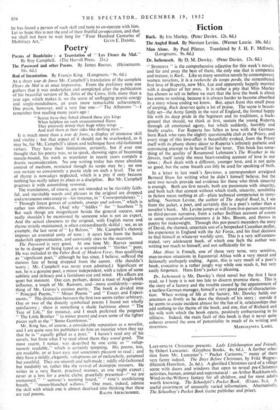Poetry
Poems of Baudelaire : a Translation of " Les Fleurs du Mal." By Roy Campbell. (The Harvill Press. 21s.) The Password and other Poems. By James Reeves. (Heinemann. 10s. 6d.) Rod of Incantation. By Francis King. (Longmans.' 9s. 6d.) As a sheer tour de force Mr. Campbell's translation of the complete Fleurs du Mal is at once impressive. From the prefatory note one gathers that it was undertaken and completed after the publication of his beautiful version of St. John of the Cross, little more than a year ago, which makes it, on the score of unflagging poetic energy and single-mindedness, an even more remarkable achievement. One poem, however, and a very fine one—" The Albatross "—I remember first reading many years ago :
" Scarce have they fished aboard these airy kings When helpless on such unaccustomed floors They piteously droop their huge white wings And trail them at their sides like drifting oars."
It is much more than a tour de force, a display of immense skill and vitality ; but that aspect of it should not be overlooked, as it may be, for Mr. Campbell's idiom and technique have old-fashioned virtues. They have their limitations, certainly, but if ever one thought that his poetry was, so to speak, showing signs of becoming muscle-bound, his work as translator in recent years compels a drastic reconsideration. No one writing today has more absolute control of medium, restricted though its scope may be ; no one can sustain so consistently a poetic style on such a level. The art of rhyme is nowadays neglected, which is a pity if only because nothing has really taken its place as a discipline. But Mr. Campbell practises it with astonishing resource. The translations, of course, are not intended to be slavishly faith- ful, and inevitably words and phrases in the original are dropped and extraneous ones creep in—for instance, in " Correspondances " " Through forest groves of symbols, strange and solemn," which is rather too obtrusive. (And why "fiddles " for hautbois " ?) But such things are insignificant beside the general success, and really shouldn't be mentioned by someone who is not an expert. And the actual closeness to the original, with English metre and rhyme strictly maintained, is often extraordinarily skilful ; see, as an .example, the last verse of " Le Balcon." Mr. Campbell's rhetoric imposes an essential unity of tone ; it saves him from the banal makeshift approximation, and constantly rises to the occasion. The Password is very good. At one time Mr. Reeves seemed to be in danger of being typed as a second-rank " 'thirties " poet. He was included in the Faber Book of Modern Verse, thus qualifying as "significant poet," although he has since, I believe, suffered the &riot's fate of being dropped from the canon. (He shouldn't worry ; Mr. Campbell was never even admitted.) Significant or not, he is a genuine poet, a minor independent, with a talent of some subtlety and delicacy and a fastidious eye and mind. His effects are quiet but insistent. One can, perhaps, detect a trace of Anglo-Irish influence, a touch of Mr. Ransom, and—more confidently—some- thing of Mr. Graves's curious purity. The book is divided into " Principal Poems," " Minor Poems " and " Essays and Experi- ments." The distinction between the first two seems rather arbitrary. One or two of the directly symbolical poems I found not wholly satisfactory ; there is something a shade factitious about " The Tree of Life," for instance, and 1 much preferred the poignant " The Little Brother " (a minor poem) and even some of the lighter pieces such as the " Stone Gentleman."
Mr. King has, of course, a considerable reputation as a novelist, and I am quite sure his publishers do him an injustice when they say that he is. " equally gifted as a poet." I haven't read any of his novels, but from what I've read about them they sound good. The most recent, I notice, was described by one critic as " volup- tuously readable," which is certainly tempting. His poems, too, are readable, or at least easy and sometimes pleasant to read ; and they have a mildly, elegantly, voluptuous air of melancholy, autumnal but youthful. They are smooth and well-made ; oddly old-fashioned but modishly so, rather like the revival of drainpipe trousers. He writes in a very fluent, practised manner, as one might expect ; never at a loss for a poetic cliche, gracefully presented—" we are unmanned," " summer's teeming hoard," " time's annihilating breath," "moon-blanched willows." One must, indeed, admire the skill with which one is almost deceived into thinking that these


































 Previous page
Previous page